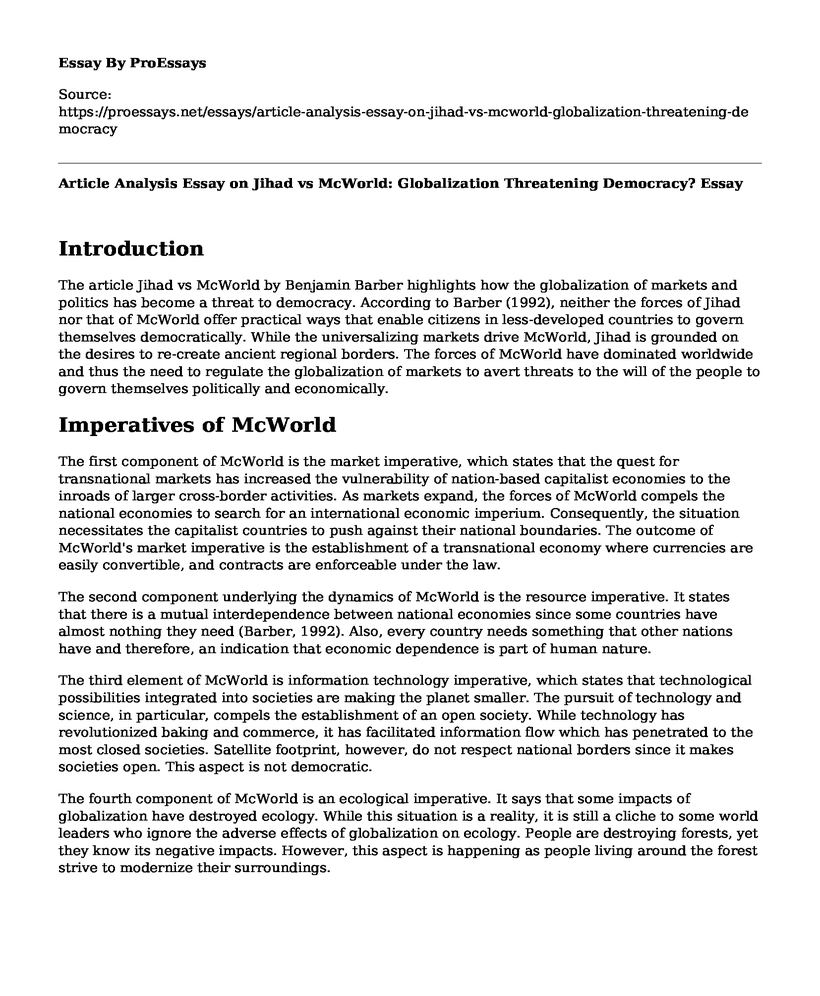Introduction
The article Jihad vs McWorld by Benjamin Barber highlights how the globalization of markets and politics has become a threat to democracy. According to Barber (1992), neither the forces of Jihad nor that of McWorld offer practical ways that enable citizens in less-developed countries to govern themselves democratically. While the universalizing markets drive McWorld, Jihad is grounded on the desires to re-create ancient regional borders. The forces of McWorld have dominated worldwide and thus the need to regulate the globalization of markets to avert threats to the will of the people to govern themselves politically and economically.
Imperatives of McWorld
The first component of McWorld is the market imperative, which states that the quest for transnational markets has increased the vulnerability of nation-based capitalist economies to the inroads of larger cross-border activities. As markets expand, the forces of McWorld compels the national economies to search for an international economic imperium. Consequently, the situation necessitates the capitalist countries to push against their national boundaries. The outcome of McWorld's market imperative is the establishment of a transnational economy where currencies are easily convertible, and contracts are enforceable under the law.
The second component underlying the dynamics of McWorld is the resource imperative. It states that there is a mutual interdependence between national economies since some countries have almost nothing they need (Barber, 1992). Also, every country needs something that other nations have and therefore, an indication that economic dependence is part of human nature.
The third element of McWorld is information technology imperative, which states that technological possibilities integrated into societies are making the planet smaller. The pursuit of technology and science, in particular, compels the establishment of an open society. While technology has revolutionized baking and commerce, it has facilitated information flow which has penetrated to the most closed societies. Satellite footprint, however, do not respect national borders since it makes societies open. This aspect is not democratic.
The fourth component of McWorld is an ecological imperative. It says that some impacts of globalization have destroyed ecology. While this situation is a reality, it is still a cliche to some world leaders who ignore the adverse effects of globalization on ecology. People are destroying forests, yet they know its negative impacts. However, this aspect is happening as people living around the forest strive to modernize their surroundings.
Author's Use of Jihad
Berber's use of the word 'jihad' in the article is different from its normal usage. The term, in most instances, is used to describe religious war, specifically, against the enemies of the Muslims. Jihad sets one culture against another, tribe against tribe and people against people. It also spreads hatred since its motive is to re-establish the ancient ethnic borders worldwide. However, the author has used the word Jihad to describe the uprising of local movements to resist the influence of McWorld in less-developed countries. Jihad occurs where the owners of multinational corporations and their brands dominate international markets to the disadvantage of local brands. As a result, a strong sense of cultural distinctiveness and nationalism accompanying McWorld give rise to fundamentalist societies.
Conclusion
The forces of Jihad and McWorld have shaped the landscape of global markets and politics. The four main dynamics of McWorld are ecological, information-technology, resource and market imperatives. These components have reinforced the quest for efficient transnational markets and international peace. However, globalization of politics and markets triggers a sense of nationalism and cultural distinctiveness, which leads to the uprising of movements to resist McWorld, especially in developing countries.
Reference
Barber, B. R. (1992, March). "Jihad vs McWorld." Atlantic Monthly. Retrieved September 14, 2019, from https://www.theatlantic.com/magazine/archive/1992/03/jihad-vs-mcworld/303882/url/
Cite this page
Article Analysis Essay on Jihad vs McWorld: Globalization Threatening Democracy?. (2023, Feb 06). Retrieved from https://proessays.net/essays/article-analysis-essay-on-jihad-vs-mcworld-globalization-threatening-democracy
If you are the original author of this essay and no longer wish to have it published on the ProEssays website, please click below to request its removal:
- Paper Example on Globalization and International Political Economy
- Articles Analysis Essay on Economics
- Essay on Globalization: A Technological Revolution in Interaction & Flow of Products
- Employee Training & Development: Essential for Improving Organizational Performance - Essay Sample
- Unwind: Exploring Different Stress-Relief Practices Around the Globe - Essay Sample
- Employees: Essential for Gaining Strategic Advantage in Competitive World - Essay Sample
- Essay Example on Onboarding: Introducing New Employees to a Comfortable Workplace







